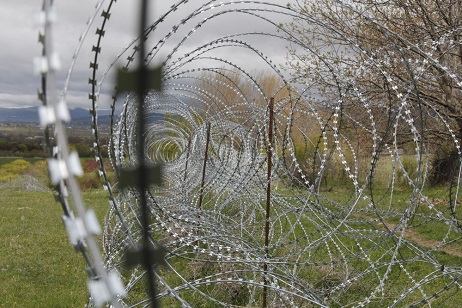Creeping occupation: Russia advances 2km into Georgian territory

Tbilisi is calling on the global community to "properly respond” to Russia’s "illegal actions” of creeping occupation at the Administrative Boundary Line (ABL) between breakaway Tskhinvali region (South Ossetia) and the rest of Georgia.
Two days ago Russia’s occupational forces illegally placed so-called border signs near Georgia’s central highway in several villages in Gori municipality in central Georgia. This action, referred to as Russia’s creeping occupation, saw about two more kilometres of Georgian soil in the heart of the country now become occupied by Russia.
Russia had already occupied about 20 percent of Georgian territory.
Georgia’s Foreign Ministry urged the international community to make a "relevant evaluation of the actions that are aimed against peace and security”, which "violate fundamental principles of the international law.”
In a special statement the Ministry said it would use all international levers to ensure Russia's provocative actions are met with a relevant response.
Meanwhile the Georgian Prime Minister’s special representative for relations with Russia, Zurab Abashidze, travelled to the Gori district and met with local residents who were effected by Russia's "border marking” activities.
Abashidze said the situation was "very critical” and he would raise this issue at his next meeting with Russia’s Deputy Foreign Minister Grigory Karasin in Prague on July 15.
The so-called Abashidze-Karasin talks are the only format of direct Georgian-Russian dialogue since the two countries cut off diplomatic ties after the 2008 August war. The first Abashidze-Karasin meeting took place in 2012 in Geneva.
The talks are limited in scope to economic and other practical issues but today Abashidze said the ABL issue was "so acute" it could not be avoided at the upcoming meeting.
Meanwhile the European Union’s Monitoring Mission (EUMM) in Georgia was also mobilised at the site, where the basic and fundamental rights of Georgian citizens had been violated by the occupational forces.
The installation of sign posts prevented local residents of the nearby Georgian villages from reaching their wheat fields.
Most of the farmers had already cultivated their land on the rural outskirts of their villages and were now worried they would not be able to access their land to collect their crops.
Today representatives from Georgia’s Interior Ministry talked to so-called border officials from the de facto Tskhinvali side and received a promise that Georgian farmers would be allowed to access their crops from the newly occupied land.
Local residents have said they were now unable to reach their pastures and would probably be forced to sell all their cattle after about 70 percent (about 10 hectares) of their fields were now under Russian and de facto South Ossetian control.
The EUMM monitors said the issue would be discussed at international level.
Additionally, the latest creeping occupation saw a portion of the BP-operated Baku–Supsa Pipeline in Georgia now become under Russian control in the breakaway Tskinvali region, as certain segments of the oil pipeline fell behind the new "border” signs.
Today a group of opposition activists rallied in Tbilisi and demanded the Government to "properly react” to Russia’s "illegal activities”, while Government representatives said their response would be "very strict”. The protesters also expected a "proper assessment of the situation” from the global community.
 Tweet
Tweet  Share
Share